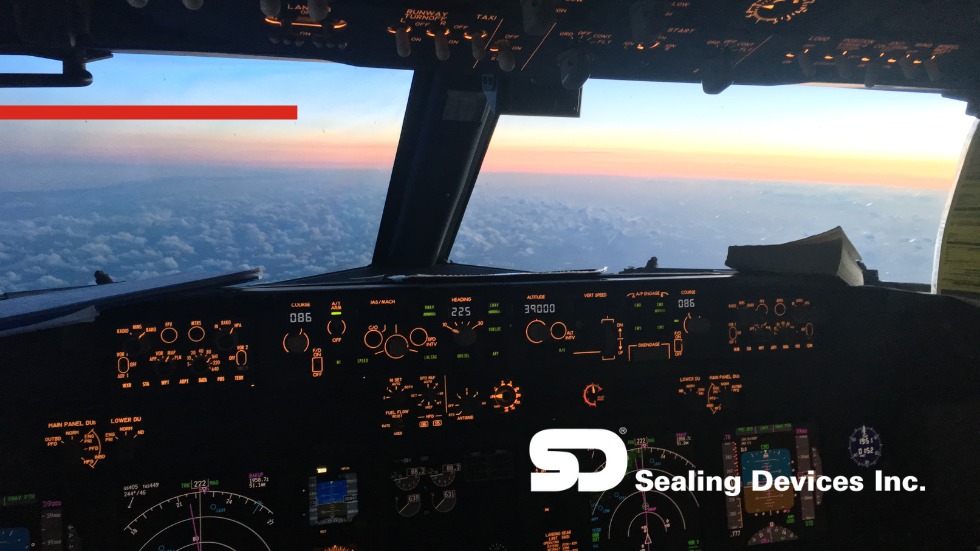Electromagnetic interference (EMI) is one of the most critical design challenges in the aerospace industry. Modern aircraft, spacecraft, and defense systems depend on complex electronics that must operate reliably in harsh environments. Without proper EMI shielding, interference can disrupt avionics, communication, navigation, and radar systems—potentially compromising mission success.
In this article, we’ll cover best practices for EMI shielding in aerospace applications, including material selection and design integration. We’ll also show how Sealing Devices supports aerospace engineers with EMI gaskets and conductive adhesives.
What is EMI Shielding in Aerospace?
Electromagnetic interference (EMI) is unwanted electromagnetic energy that can disrupt sensitive electronic systems. In aerospace, EMI can come from onboard electronics, external radio frequency (RF) sources, or even lightning strikes.
EMI shielding involves using conductive materials to block or attenuate this interference, ensuring that electronics function safely and reliably in flight. Aerospace shielding must balance high performance, low weight, and compliance with stringent industry standards.
1. Identify EMI Sources Early in Design
The first step to effective EMI mitigation is understanding where interference originates and how it impacts your systems. Aerospace environments involve:
-
- High-frequency emissions from radar and avionics in terms of signal strength and frequency range
- Galvanic interaction between the precious metal fillers used for shielding and the flange faces
- Close-proximity electronics that increase crosstalk risk
- Extreme temperature and altitude changes affecting materials
- Vibration and mechanical stress that degrade shielding performance
By incorporating EMI analysis during early design stages, engineers can select optimal materials and shielding strategies.
2. Select the Right EMI Shielding Materials
Material selection is crucial for aerospace EMI control. Popular solutions include:
-
- Common fillers are Silver, Silver Aluminum, Nickel, Nickel Aluminum, and Nickel Graphite
- Silicone or fluorosilicone elastomer gaskets are common
- Provide environmental sealing and EMI suppression
- Common in aircraft panels, avionics enclosures, and connectors
- Low outgassing offering available
- Offers high levels of shielding
- Great for low closure force applications that require repeated gasket cycling
Metal Mesh & Wire-Oriented Gaskets
-
- Excellent for high-frequency EMI shielding
- Ideal for enclosures requiring both mechanical strength and conductivity
-
- Lightweight, flexible alternatives to fasteners
- Used in limited-space aerospace applications
Sealing Devices offers EMI shielding materials tested to MIL-DTL, ASTM, and AS9100D aerospace standards, ensuring compliance and reliability.
3. Integrate EMI Shielding into Design
Even the best materials can fail without proper integration. Follow these aerospace EMI best practices:
-
- Ensure Clean, Flat Surfaces: Poor contact reduces conductivity.
- Apply Uniform Gasket Compression: Prevents gaps that allow interference.
- Avoid Galvanic Corrosion: Match materials to prevent dissimilar-metal corrosion.
- Optimize Weight: Combine adhesives with gaskets to reduce hardware and mass.
Designing for EMI control upfront minimizes costly redesigns later.
4. Work with an Experienced EMI Shielding Partner
EMI shielding in aerospace demands expertise. At Sealing Devices, we combine:
-
- Decades of aerospace experience with EMI solutions
- AS9100D-certified manufacturing for compliance
- A full range of EMI materials: conductive elastomer gaskets, metal mesh, conductive adhesives
Whether you’re developing commercial aircraft, satellites, or defense electronics, we provide the materials, testing, and technical support you need for EMI compliance.
Contact Sealing Devices for Aerospace EMI Solutions
If you’re designing for EMI control in aerospace, our team can help you select the right materials, prototype faster, and validate shielding performance.
📞 Contact Sealing Devices today to request EMI gasket samples or schedule a consultation with our aerospace specialists.
